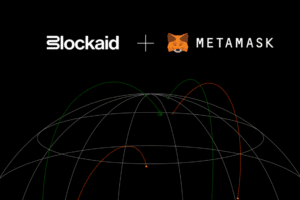The popular crypto wallet MetaMask has added a new feature that allows users to enable security alerts.
These are privacy-focused security alerts provided by Blockaid that were already added in October but are now being extended by default to all users. They are available on mobile in the “Experimental” section.
The company has also published a short descriptive video on X to show how to activate it.
Privacy-focused MetaMask Security Alerts from @blockaid_, initially added in October, are now default for all Extension users and coming to Mobile under “Experimental”. Be sure to opt-in on Mobile!
Our commitment to keeping your assets secure just got stronger

pic.twitter.com/5n9WoCke3V
— MetaMask
(@MetaMask) February 20, 2024
MetaMask crypto wallet security alerts for its users
This new feature of the MetaMask wallet helps users stay safe, as it allows for transaction simulation and alerts of any harmful dApps.
Thanks to the collaboration with Blockaid, the wallet enhances the level of privacy making it possible not to share one’s transactions with third parties in case of a possible fraud alert.
The feature was launched in October, but only experimentally and only on Ethereum. Now, however, they have extended it to more networks for mobile device users. Soon this feature will be enabled by default on mobile.
The company expects that thanks to this integration, hundreds of millions of dollars in assets will be saved just this year.
The supported networks, in addition to Ethereum, are: Linea, BNB chain, Polygon, Arbitrum, Optimism, Avalanche.
The success of MetaMask
The official announcement from the company in which they announced the news also states that in the last quarter of 2023 there was a surge in installations and usage of MetaMask. In fact, from September 2023 to January 2024, the monthly active users of the crypto wallet increased by 55%.
However, the company also emphasizes how the cyber and financial attacks that particularly target the DeFi world are now sophisticated and diversified, because hackers exploit vulnerabilities both on-chain and off-chain. The main issues are the compromise of private keys, price manipulation attacks, and exploitation of smart contracts.
They also claim that since December they have witnessed numerous high-profile attacks in the crypto sector, so much so that for example during the Ledger Connect Kit incident the frontends of almost 100 dApps were compromised. They also add that in that case MetaMask users who had enabled Blockaid security alerts were protected, saving about $1.15 million.
One of the security measures introduced by MetaMask is protection against possible “unexpected outcomes” of transactions, such as the unintentional approval of a transaction by a phisher, because they are one of the main incidents reported by users.
Self-custody and security for users introduced by the MetaMask crypto wallet
Although self-custody of crypto assets implies greater responsibility on the part of users, it is still the most recommended custody methodology, especially for experienced users, because it prevents having to trust third parties.
However, in order to avoid theft or losses, it is necessary to always remain very informed and vigilant, because scammers constantly come up with new threats to which one must be prepared to respond.
MetaMask writes:
“Although we can implement all the tools in the world to try to keep you as safe as possible (and we do), good security hygiene is essential for navigating this (sometimes scary) maze.”
The company declares to have a dedicated team that keeps up to date on the latest attack vectors and publishes security reports every month. Just last year, over $1.7 billion in cryptocurrencies were stolen, so the company simply suggests not to do anything and not to interact in case of doubt.
Or, even just a doubt is enough to make it convenient to stop and not go further.
According to a recent study by Blockaid, 1 out of 10 apps would be harmful and should therefore be avoided.
Scams
The main problem is not development errors, bugs or cyber attacks, but simple scams, even if sometimes they are carried out with more or less sophisticated tools.
Indeed, unfortunately the best way to steal funds from users is simply to convince them to send some of their funds to scammers, or to give them access to the wallet.
In order to achieve this, scammers have become very skilled at exploiting the so-called social engineering, that is, techniques of manipulation of the psyche and reasoning with which they manage to convince their victims with clever lies to actually give them cryptocurrencies.
Since on-chain crypto transactions are absolutely irreversible, if the chain is decentralized, once the tokens are sent they can no longer be recovered. Furthermore, scammers often operate from foreign countries, making them extremely difficult to identify.



